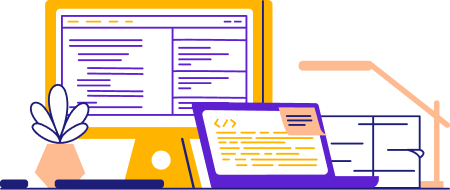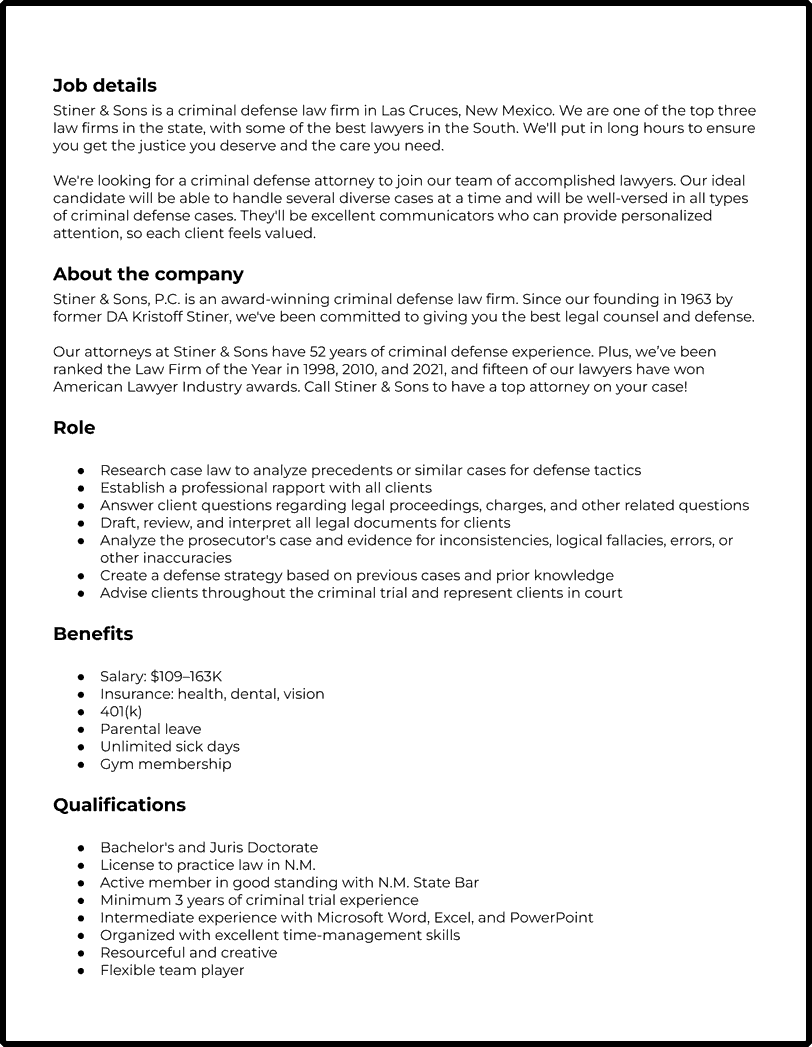Attorneys face extreme stress, ongoing research, late nights, tragic cases, and high expectations; they might enjoy the hefty salary, but they also like the work and winning cases for their clients.
According to the American Bar Association Journal, attorneys are called to be public servants devoted to improving their profession and the court system. The best attorneys are creative, compassionate, patient, and logical.
Hiring a great attorney is a multi-step process, just like a legal case, but you can get a leg-up with a stellar job description. BeamJobs will guide you through the process to make sure you make a winning first impression with your attorney job description.
Your Guide to Writing the Best Attorney Job Description

Job descriptions are your first impression, so it’s in your best interest to show that you’re professional and prepared. Often, though, job descriptions are boring, ambiguous, and superficial. Some writers pour their efforts into describing the job on the company website but become oddly lax with the ones on job boards. (We’ve seen five different job descriptions for government positions with just the word “help” listed in the requirements.)
The problem is, how many readers are going to make it to your website when all they see is poor content? The answer is “not many.” If you have subpar content, attorneys will readily spot a lack of care and attention. A clumsy job description will turn away high-caliber applicants, so it pays to invest in writing a winning job description.

Due process for job descriptions
Writing a great job description follows a series of steps, just like a legal case. We’ve provided an outline below, so you know exactly what to include, but of course, the writing part is up to you!
The first step is to get words on paper (or the screen). Use the outline we’ve provided and fill in all relevant details. Write in the details until the outline is complete. What do you think your attorney needs to know? What’s essential to do the job?
Then go back and add one key element: why you’re hiring. You need an attorney, but what specific function do you need them to fulfill? Is your firm growing, and do you need a tried and tested attorney on your family law team?
Do you need an attorney fluent in Spanish for your immigration law firm? Make it abundantly clear what role you expect your attorney to fill.
Even though you now have all your information down, you’re far from finished. Revision is one step most writers miss, but it’s essential when attracting amazing attorneys. Grammarly has an excellent guide on revising for conciseness, which is critical for a job description.
Shorten sentences, use power verbs, and keep your applicant in mind. They already have to read pages and pages of legal jargon—don’t make them scroll through paragraphs of useless information so they can apply for the job. Keep it simple, and the attorney cover letters will begin pouring in!
After you’ve revised for content and conciseness, adjust your tone. Attorneys are persistent, caring, and discerning—does your job description reflect those qualities? If it doesn’t, read some sources about attorney work to see how real attorneys act and think. One great example is the Power of One article about the lawyer as an advocate—attorneys are both personal and professional, which your job description needs to mimic.
Now it’s time for cross-examination! Have your co-workers read through your job description and ask what works and what’s irrelevant or confusing. It’s hard to hear corrections, but it will strengthen your argument (your job description). Once you’ve heard their counterarguments, make the necessary revisions.
Lastly, review your formatting. Even if your content gets a winning verdict, poor formatting can ruin your efforts. When uploading your job description to job boards, check that it looks exactly as intended.
Then, hit “submit” and wait for your future applicants to start sending in their attorney resumes!
Make an Outline to Start Your Attorney Job Description

It may feel like writing a case brief is easier than writing a job description, but never fear! Use this handy outline to guide you through the process.

Job details
This is an introduction to your company, the job, and why you’re hiring a new attorney. Include just enough points to be informative, but not so many it’s overwhelming. As brief as it is, though, don’t feel like you can’t be interesting—strike a balance between professional and engaging to draw the reader in without appearing overly formal or too casual.

About the company
Many job descriptions add too much information here. Again, those job descriptions forget their audience. It’s important to talk about your company, so the applicants know who they’ll represent and work for, but they don’t need to know every case your firm has won. Be brief and to the point, while still upbeat and relaxed in this section.

What you’ll be doing
Most attorney positions share similar responsibilities, but that doesn’t mean you should neglect this section. Every role varies, just as every company is different, so your job description should reflect that (Please don’t just write “provide legal counsel” and leave it at that). Give concise requirements that are detailed but limited in number to provide an accurate portrait of your future attorney’s general tasks.
- Analyze the prosecutor’s case and evidence for any loopholes, logical fallacies, or errors
- Identify potential risks with company ventures in regards to forestry law
- Draft and review all legal documents for accuracy and completeness, including correspondence, a COI, a POA, the TEAS Plus, and any other documents

Qualifications
Many job descriptions either stuff or starve this section. Both sides forget the goal: to give a snapshot of the skills required to do the job. You shouldn’t list every possible qualification, nor should you assume that a degree and license are enough. Be descriptive, but remember that qualifications aren’t everything, and sometimes amazing candidates might not have the experience yet.
- Juris Doctorate from accredited law school
- Oregon law license
- Member in good standing with State Bar of Oregon
- Minimum 3 years of criminal trial experience
- Intermediate experience with Microsoft Word, Excel, and Powerpoint

Benefits
Benefits are a great way to entice applicants, so adding this section can be a major bonus. This section includes a salary range, insurance options, and other perks your company offers. Feel free to get specific, too—a few fun benefits like “Food Truck Fridays” make you sound more personable.
That being said, don’t put this information first. It’s not the most important, so it needs to come later on in the list.
The Many Responsibilities and Functions of an Attorney

It’s easy to imagine attorneys forever living in court or studying case law in their offices; however, they balance much more than just those responsibilities. If you’re struggling to understand an attorney’s daily life, use the following list to generate some examples for your job description. One attorney may not be doing all of this, but it’s a general outline of the expected functions of most attorneys.

Servant
- The main goal of an attorney is to serve the public, making them servants of the people (but not public servants in the official sense). Whether they work in the government or private practice, attorneys are there to make sure justice is delivered. Not all attorneys will work in an official public law setting as official public servants. Still, attorneys do their best to help people (and according to the ABA Journal, it’s often why they love being lawyers).
- Provide legal advice to clients, representing, defending, and advocating for them in a court of law. Must demonstrate a professional, trustworthy, and caring attitude toward clients.
- This role requires strong interpersonal and verbal communication skills and a dedication to doing good for the community.

Court representative
- It’s the classic image of an attorney—them standing in a courtroom, debating the case, and standing up for their client. However cliché, it still holds for some attorneys (namely, trial and criminal defense attorneys). This isn’t the case for all attorney positions, but it’s an important role that many play.
- Support the client at the arraignment, present the case facts, present evidence, cross-examine witnesses, answer client questions, and talk to the jury, witnesses, and judge.
- This role requires solid verbal and interpersonal communication skills and an analytical mindset. They must also be a confident, experienced negotiator.

Researcher
- Attorneys have to know their case inside and out, which means understanding everything about the case, including previous rulings, requirements of the law, and good defense/prosecution tactics. Thus, attorneys spend a lot of their time studying and memorizing.
- Analyze the facts of a case and find relevant primary and secondary sources relating to laws/regulations/statutes/treatises involved in the case based on its jurisdiction.
- Review all sources to confirm accuracy and relevancy using a citator, and create a defense or prosecution strategy for the client.
- Use technology like Casetext, Clio Manage, and KeyCite to aid your research.
- This role will require familiarity with citators and case law technology, strong written communication, excellent critical thinking skills, and experience conducting legal research.

Advocate
- To clarify, we’re talking about the general responsibilities of advocating for someone, not the professional position of an advocate (which is different from an attorney). Being an advocate means becoming a client’s spokesperson and legal consultant. They speak for their client and offer help as they navigate the legal process. It’s a humbling responsibility to take on someone’s sorrows and fight their battles, but it’s one that attorneys choose every day.
- Explain legal proceedings, practices, and documentation to the client, and answer any questions they may have.
- Represent your client to the best of your ability and with integrity to legal professionals to obtain a favorable result for the client and the company.
- This role will require stellar interpersonal, written, and oral presentation communication skills. It will also require diligence, confidence, and high emotional intelligence.

Problem solver
- Put simply, attorneys solve problems. All-day, every day, lawyers find answers and fix problems. They see their clients facing huge fines, lawsuits, or potential legal trouble, and they find a solution. But even beyond that, they’re mindful of improving their company and its legal procedures.
- Identify ineffective or inefficient methods throughout the legal process, define the problem, and find a solution through research, consultation, or restructuring.
- Research client cases to find precedents and relevant sources, then create a legal strategy to obtain the best outcome possible.
- This role will require sharp critical thinking skills and a creative, analytical mindset.

Salesperson
- It sounds too basic to say an attorney does sales work, but it’s true. Salespeople and attorneys both identify the client’s problems and find solutions. According to Inc.com, attorneys are very similar to salespeople. They convince the client that signing with them is the best decision and work to make their partnership operate as smoothly as possible.
- Identify the needs and concerns of the client and devise strategies to relieve them of said problems by working with our firm. While working with a client, identify obstacles and propose solutions while serving them in a friendly, trustworthy manner.
- This role will require advanced critical thinking skills, written/verbal/interpersonal communication skills, and a problem-solver mindset.








